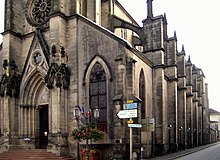Plombières-les-Bains
| Plombières-les-Bains | ||
|---|---|---|

|
|
|
| region | Grand Est | |
| Department | Vosges | |
| Arrondissement | Epinal | |
| Canton | Le Val-d'Ajol | |
| Community association | Porte des Vosges Méridionales | |
| Coordinates | 47 ° 58 ′ N , 6 ° 28 ′ E | |
| height | 335-576 m | |
| surface | 27.20 km 2 | |
| Residents | 1,678 (January 1, 2017) | |
| Population density | 62 inhabitants / km 2 | |
| Post Code | 88370 | |
| INSEE code | 88351 | |
| Website | www.plombiereslesbains.fr | |
 Location of Plombières-les-Bains in the Vosges department |
||
Plombières-les-Bains is a French commune with 1678 inhabitants (January 1, 2017) in the Vosges department in the Grand Est region ( Lorraine until 2015 ). It belongs to the Arrondissement Épinal and is the capital of the canton of Plombières-les-Bains .
geography
The city lies on the banks of the Augronne River . There are 27 low-mineralized hot springs rich in trace elements in the municipality . The thermal sources of Plombières reach temperatures from 57 to 84 degrees. The municipality is located in the Ballons des Vosges Regional Nature Park . The village of Ruaux has belonged to Plombières-les-Bains since 1973 .
Neighboring municipalities of Plombières-les-Bains are Bellefontaine in the north, Saint-Nabord in the northeast, Le Val-d'Ajol in the east and southeast, Fougerolles-Saint-Valbert with Fougerolles in the south, Aillevillers-et-Lyaumont in the southwest, Le Clerjus in the West and Xertigny in the northwest.
history
The springs of Plombières were discovered in Gallo-Roman times and used for the first thermal baths. Destroyed during the Great Migration , it was rebuilt in the Middle Ages. On a property that belonged to Remiremont Abbey , Duke Friedrich III. build a fortress on the left side of the Augronne around 1292, which was probably destroyed in a fire in 1297.
Among the visitors to the bath were Michel de Montaigne , Voltaire , the Duke of Guise , the Dukes of Lorraine , Beaumarchais (according to some sources, the premiere of his romantic comedy The Great Day or Figaro's Wedding is said to have taken place here), Napoléon Bonaparte , Joséphine de Beauharnais , Napoléon III. , Hector Berlioz , Alphonse de Lamartine and Alfred de Musset .
On July 21, 1858, the secret meeting between Napoleon III took place in the Pavillon des Princes (today the administration of the Société thermale ). and Camillo Cavour , Prime Minister of the Kingdom of Sardinia-Piedmont . At this meeting, the two signed a treaty in which France promised its support in the event of an Austrian attack (→ Sardinian War ). In return, Cavour had to cede the Kingdom of Savoy and the county of Nice . This treaty was an important prerequisite for the unification of Italy in 1861 (→ Risorgimento ).
| year | 1962 | 1968 | 1975 | 1982 | 1990 | 1999 | 2007 |
| Residents | 2,701 | 2,770 | 2,486 | 2,297 | 2,084 | 1,906 | 1,955 |
Attractions
- Bain Stanislas , an 18th century bathhouse
- Bain National , a classicist bath house from the 19th century
- Thermes Napoléon , bathhouse and grand hotel from the 19th century
Partner communities
In 1980, Plombières-les-Bains entered into a partnership with the German municipality of Rickenbach (Hotzenwald) in Baden-Württemberg . Another partner municipality is Saint-Claude (Guadeloupe) (since 2013).
Personalities
- The French painter François-Louis Français (1814–1897) and the Catholic Archbishop André-Georges Bontems (1910–1988) were born in Plombières-les-Bains.
Individual evidence
- ↑ Marc Boyer: Histoire générale du tourisme du XVIe au XXIe siècle , p. 64. Éditions L'Harmattan, Paris, 2005. (Officially, however, the Théâtre de l'Odéon in Paris is the location of the premiere.)
- ^ Website of the municipality



